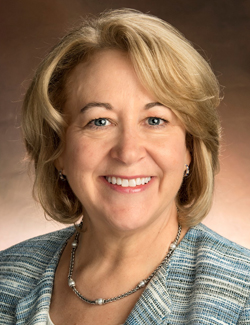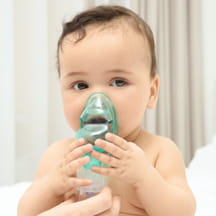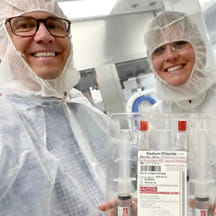Joni Rittler has decades of experience in health care supply chain management.
And in those 32 years, she hasn’t just overseen a consolidated service center for the largest children’s hospital in Pennsylvania — she also impacted the local economy within the Philadelphia area.

chain officer of CHOP.
Rittler joined Children’s Hospital of Philadelphia (CHOP) in 2010 with a focus on transforming the supply chain enterprise. Her accomplishments range from enhancing the enterprise resource planning (ERP) system to establishing a service center to expanding the use of local and minority-owned businesses.
She proved that collaboration and data-driven decision-making can lead to meaningful financial and operational outcomes. Rittler used benchmarking data to identify opportunities to reduce supply costs, then aligned with clinical teams to develop negotiation strategies.
The collaboration led to more than $100 million in cost reductions during her 15-year tenure. However, Rittler says her proudest achievement is the partnership and trust that she has built with the nurses and physicians at CHOP.
Over time, she has worked closely with the Children’s Hospital Association (CHA) to share her expertise in the supply chain community and mentor other professionals in the industry.
CHA asked Rittler about how she optimized operations to build a resilient pediatric health care supply chain and support better patient outcomes.
What unique challenges do children’s hospitals face in sourcing supplies?
Children’s hospitals require a wide range of sizes for pediatric patients; the volume on the smaller sizes is low compared to adult sizes. Many suppliers have rationalized their production and product lines, and some have discontinued pediatric-specific sizes, making it difficult to find suitable substitutes.
In some cases, physicians collaborate to help design and develop pediatric-specific products, but when manufacturers are unable to supply these specialized items, it directly impacts patient care.
How do you attract local and minority-owned businesses for service contracts?
CHOP values the positive impact we can have on our community and recognizes that a financially thriving community contributes to overall health. We actively identify opportunities for small, local, and minority-owned businesses to work with the hospital. We host supplier forums to educate businesses on how to engage with our organization, and we invite local vendors to showcase their goods to families and employees. We coordinate meet-and-greets with local suppliers and internal departments to build confidence in the supplier and ensure a fair assessment of their ability to support our needs. Local and minority-owned suppliers, who are prescreened, are encouraged to respond to our requests for proposals.
What motivated the transformation of the ERP system?
ERP systems provide consolidated data on core financial and business functions, enabling greater efficiency in routine tasks such as order placement, payment processing, and supplier management.
We are evaluating our ERP system’s expanding capabilities, particularly with the integration of artificial intelligence. These advancements will allow us to automate routine tasks, freeing staff to focus on higher-value activities, such as strategic supply planning or exploring opportunities with local businesses.
By leveraging these innovations, we can optimize operations while supporting better outcomes for patients and the organization.
How have you earned clinician trust during your career?
I can’t stress enough the importance of developing relationships with your clinicians. I respect the work of our clinical teams and want them to have the best supplies and tools to care for our patients. Building trust requires intentional relationship-building and consistent follow-through.
In my experience, trust is earned by standing behind your word, taking action, and maintaining transparency — whether through sharing relevant data or openly communicating the cause of and resolution for issues.
CHOP’s fair and just culture allows supply chain and clinical teams to partner effectively in finding solutions without assigning blame. Our shared mission of caring for kids always grounds the conversations and enables effective partnerships.
Why is a resilient supply chain important in pediatric health care?
Children’s conditions can decline more quickly than adults'. For example, during the recent intravenous (IV) solution shortage, clinical teams could often adjust fluids for adults or use alternative solutions. In pediatric patients, particularly infants, IV fluids may serve as the primary source of nutrition and hydration.
During shortages, children’s hospitals must carefully assess patient impact and advocate collectively to ensure their needs are met. The health care supply chain can learn from industry supply chains on how to drive supplier performance and measure supplier effectiveness. A strong, resilient supply chain is required to safeguard the health and outcomes of our youngest patients.
Additionally, the U.S. Food and Drug Administration provides grants via the Pediatric Device Consortium to advance the development of pediatric medical devices. Supply chain leaders can support this consortium by engaging early with developers and sharing information on marketing products to hospitals.
What is your hope for the future of pediatric health care supply chains?
As pediatric health care continues to navigate an ever-changing environment — including financial pressures and evolving regulations — I hope that the pediatric community can maintain its independence and influence to best serve the unique needs of our patients.
Supply chain teams will play a critical role in reducing expenses, improving operational efficiency, and advocating for fair pricing of supplies and pharmaceuticals.
I encourage increased collaboration across our hospitals to eliminate redundancies, share best practices, and learn from peers in adult health care who have navigated similar challenges for decades. We have a shared vision and mission to ensure high-quality, sustainable care for every child.


